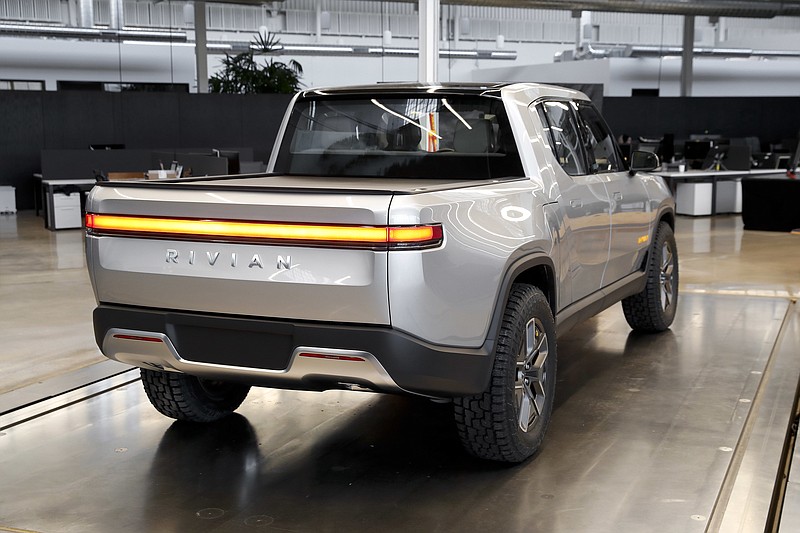NORMAL, Illinois - As problems go, Rivian CEO and founder R.J. Scaringe believes he has a good one.
The startup EV manufacturer has renovated a shuttered Normal factory, created thousands of jobs, raised billions of dollars and launched production of an electric pickup truck and SUV that have captured the imagination of the automotive world.
But six months after the first R1T truck rolled off the assembly line at the former Mitsubishi plant, Rivian can't build its $70,000 EVs fast enough to satisfy customer demand - or some Wall Street analysts and industry critics. Scaringe cited the simultaneous ramp-up of several different models and the broader supply chain issues roiling the auto industry as hampering production.
"Demand is more than we can produce at peak capacity, which is good, but it's still a problem," said Scaringe, 39, during a recent plant tour. "Our job is to make sure that that's not the case."
Hoping to assuage concerns, Scaringe opened the doors to his 3.3 million-square-foot factory last week, demonstrating both the progress Rivian has made, and the urgency to increase production.
When Rivian hosted its first open house in the Normal town circle in fall 2019, the sprawling plant on the outskirts of town was still a hulking shell and empty parking lot overrun by geese, undeterred by a handful of coyote statues guarding the vacant grounds.
Two and a half years later, the geese are still there, but they have plenty of company. The parking lot is packed and the plant is buzzing with 5,200 employees and 810 massive robots building thousands of R1T pickups and R1S SUVs, along with two models of EV delivery vans for Amazon, an early Rivian investor.
California-based Rivian, which is sitting on $18 billion in cash, has orders for more than 83,000 consumer EVs and 100,000 Amazon vans, but it built only 2,553 vehicles during the first quarter. Scaringe said the plant is on track to hit a target of 25,000 vehicles this year. Rivian would be able to produce 50,000 vehicles this year, if not for supplier constraints, he said.
The people and the processes are in place to reach the plant's 150,000-vehicle capacity by the end of 2023, but ramping up to full production has been slowed by pandemic disruptions and raw material shortages that "haven't been seen in the history of the industrialized world," Scaringe said.
The global semiconductor shortage has been exacerbated at Rivian by its limited production history, with suppliers earmarking computer chips for established automakers first, the company said. In addition, Rivian is having supply chain issues with wire harnesses and printed circuit boards.
"An R1 has roughly 2,000 different components. We have 1,999 of those, and that doesn't equal a car," said Scaringe. "So that's the challenge. It requires the completeness of the supply chain to achieve ramp."
When Rivian went public in November, investors were betting the EV startup would become the Tesla of trucks, pushing its valuation north of $100 billion - more than Ford or General Motors. But the stock, which hit a high of $179.47 in mid-November, has fallen sharply this year amid the slow ramp-up, closing at $38.23 per share Monday and cutting Rivian's market cap to about $34 billion.
In February, Rivian brought in a new vice president of manufacturing operations at its Normal plant, replacing Erik Fields with Tim Fallon, both former Nissan executives.
While the company is building a second $5 billion assembly plant in Georgia to keep up with anticipated future demand, the pressure to ramp up now is on in Normal, creating a top-down mission across the entire workforce to launch the EV maker into full production.
"It's almost like we're trying to get to the moon," said Victor Taylor, senior director of stamping, body and plastic at the Rivian plant, one of several executives helping lead last week's tour.
Mitsubishi opened the Normal plant in 1988. In its heyday, it produced more than 200,000 vehicles per year, while staffing levels reached about 4,000. When the Mitsubishi plant closed amid waning production in July 2015, it left 1,100 people out of work.
Scaringe, a Massachusetts Institute of Technology graduate with a doctorate in mechanical engineering, founded Rivian in 2009, and found a production home in Normal after visiting the shuttered plant about 130 miles south of Chicago in 2016.
Having an idled auto assembly talent pool was another asset for Scaringe, who ended up buying the factory for $16 million from a liquidation firm in January 2017. The company has gone from 300 employees in Normal to more than 5,200 in about two years.
Construction has begun to expand the 3.3 million-square-foot factory to 4 million square feet by the fourth quarter, which will increase production capacity to 200,000 vehicles per year, Scaringe said. It will also require more assembly workers.
Cindy Nicola, vice president of talent acquisition at Rivian, said the company plans to hire as many as 1,500 additional manufacturing employees at the plant by the end of the year. The starting salary is $20 an hour, and the assembly line already includes dozens of former Mitsubishi autoworkers, Nicola said.
